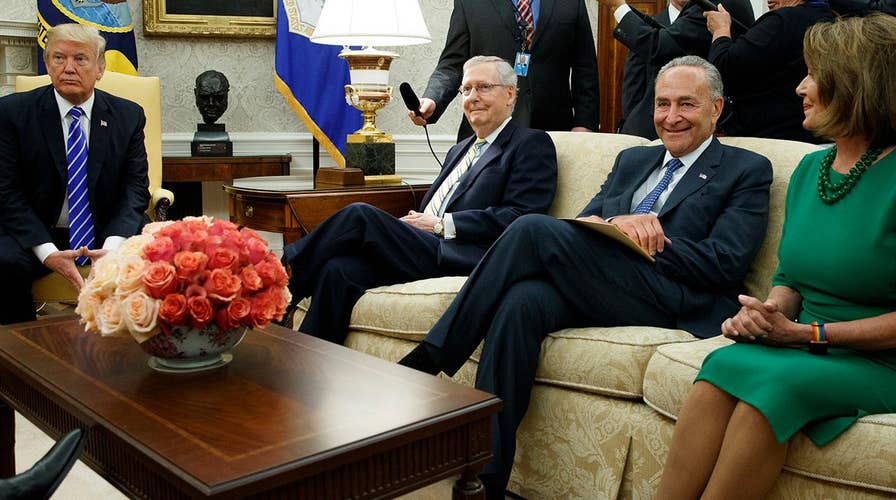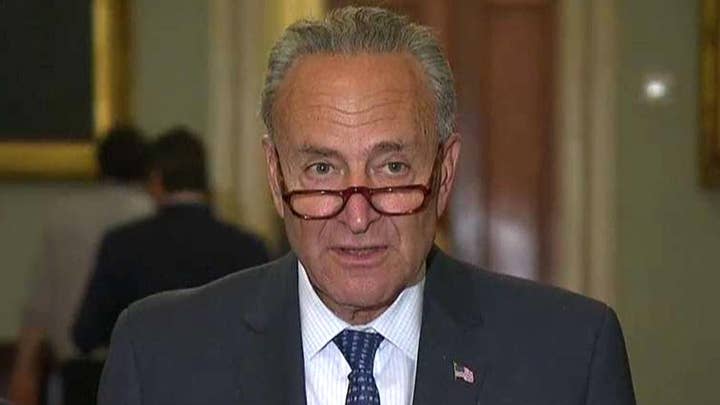President Trump sides with Democrats on debt ceiling deal
Some Republicans displeased with new compromise; Peter Doocy reports from Capitol Hill
President Trump struck a deal Wednesday with Democratic leaders to raise the federal debt ceiling and fund the government for the next three months while also providing Hurricane Harvey relief money -- hours after House Speaker Paul Ryan blasted such a plan as “unworkable” and “disgraceful.”
The president, meeting with congressional leaders from both parties, effectively brushed off calls from GOP leaders for a longer-term plan.
Those lawmakers had pushed first for an 18-month debt-limit hike and then floated a six-month plan, Fox News is told – but Senate Minority Leader Chuck Schumer, D-N.Y., and House Minority Leader Nancy Pelosi, D-Calif., held firm on calls for a three-month deal.
Trump agreed.
“We had a very good meeting with Nancy Pelois and Chuck Schumer,” he told reporters aboard Air Force One. “We agreed to a three-month extension on the debt ceiling, which they consider to be sacred, very important.”
The announcement was striking considering just hours earlier, Ryan warned such an arrangement could put Harvey relief funds at risk.
“To play politics with the debt ceiling like Schumer and Pelosi apparently are doing, I don’t think is a good idea,” said Ryan.
The House on Wednesday overwhelmingly approved an initial $8 billion in funding for Harvey relief, on a 419-3 vote.
The plan all along was for the Senate to attach a debt-ceiling hike to the bill and then send it back. But Ryan and other top Republicans objected to Democrats’ push to only raise the debt ceiling for a three-month period.
Yet following the Trump meeting, Senate Majority Leader Mitch McConnell acknowledged they had all agreed to a three-month deal – saying he would be adding that to the Harvey bill.
“I’ll be supporting it,” McConnell said.
Schumer called the arrangement “a really good moment of bipartisanship."
Not everyone thinks so.
Sen. Ben Sasse, R-Neb., issued a brief statement saying only: "The Pelosi-Schumer-Trump deal is bad."
It’s unclear whether the “deal” has the votes to pass. But under the terms, government funding and the debt limit would be extended through Dec. 15, in turn avoiding a government shutdown Sept. 30.
Trump said they also agreed on emergency hurricane funding, which will likely increase with Hurricane Irma heading toward Florida.
“We had a very good meeting,” Trump continued. “I think the deal will be very good.”
The bipartisan support Wednesday for the initial House vote on Harvey aid was no surprise considering how Harvey essentially put Houston and the rest of southeast Texas underwater before striking Louisiana, causing a projected $160 billion in damage.
The Harvey package now goes to the GOP-controlled Senate. If the combo version passes, it will then return to the House for final approval.
While GOP leaders had hoped for a longer-term deal on the debt ceiling, some conservatives were also agitated over the move to have the Senate attach the hike after the House votes.
A senior House member, who asked to not be identified, called the tactic a “charade” and asked, “Why not attach the debt ceiling in the first place?”
Any votes to increase federal borrowing also are problematic for fiscal conservatives principally opposed to increasing debt and spending.
The Trump administration originally had asked Congress to raise the debt limit by Sept. 29 to keep the federal government from defaulting on its bills.
Then Treasury Secretary Steve Mnuchin made a plea on “Fox News Sunday” this past weekend for Congress to increase the borrowing authority along with a Harvey aid package, amid fears the government won’t have enough cash to help Harvey victims in immediate need of assistance.
“The red flags that the White House waved are real,” House Ways and Means Committee Chairman Rep. Kevin Brady, R-Texas, said Tuesday.
The House’s two big, fiscally conservative groups -- the House Freedom Caucus and the Republican Study Committee -- have already expressed reservations about a combo vote.
However, members also don’t want to be vilified for stiffing Harvey flood victims -- particularly with Hurricane Irma now taking aim at Florida and after Congress took months after 2012’s Superstorm Sandy to approve emergency funding.
Fox News' Joseph Weber and Chad Pergram contributed to this report.













































